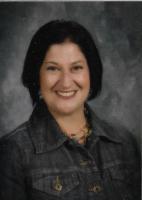The Black Dot
How would you describe this to others who could not see the page?
There once was a professor who entered his classroom and asked his students to prepare for a surprise test. They all waited anxiously at their desks for the exam to begin.
The professor handed out the exams with the text facing down, as usual. Once he handed them all out, he asked the students to turn over the papers.
To everyone’s surprise, there were no questions–just a black dot in the center of the paper.
The professor, seeing the expression on everyone’s faces, told them the following: “I want you to write about what you see there.” The students, although confused, started on the inexplicable task.
At the end of the class, the professor collected the exams and began reading each one of them out loud in front of all the students. All of them, without exception, defined the black dot, trying to explain its position in the center of the sheet.
After all had been read, the classroom silent, the professor started to explain: “I’m not going to grade you on this, I just wanted to give you something to think about. No one wrote about the white part of the paper. Everyone focused on the black dot – and the same thing happens in our lives. However, we insist on focusing only on the black dot – the health issues that bother us, the lack of money, the complicated relationship with a family member, the disappointment with a friend. The dark spots are very small when compared to everything we have in our lives, but they are the ones that pollute our minds. Take your eyes away from the black dots in your lives. Enjoy each one of your blessings, each moment that life gives you. Be happy and live a life filled with love!”
What is your black dot? What draws your focus and pulls you from finding joy?
While reading excerpts from Pope Francis’ "Gaudete et Exsultate" ("Rejoice and Be Glad"), an apostolic exhortation on holiness, I found joy. His explanation of God’s plan for all of us and what holiness means comes at a time when symbols of rebirth are evident as the seasons change.
He writes about "the saints next door" and said he likes "to contemplate the holiness present in the patience of God's people: in those parents who raise their children with immense love, in those men and women who work hard to support their families, in the sick, in elderly religious who never lose their smile."
Reading the excerpts has reaffirmed my affection for the Beatitudes in which, Pope Francis said, "Jesus explained with great simplicity what it means to be holy" - to live simply, to trust in God’s plan and not earthly wealth or power, to remain humble, to show mercy and forgiveness and work towards justice.
He writes that holiness is holistic, and comparing our paths with others’ is futile; no one should claim that their particular call or path is the only worthy one.
Each person, he said, needs "to embrace that unique plan that God willed for each of us from eternity."
For this moment, it has pulled me from the black dot.



